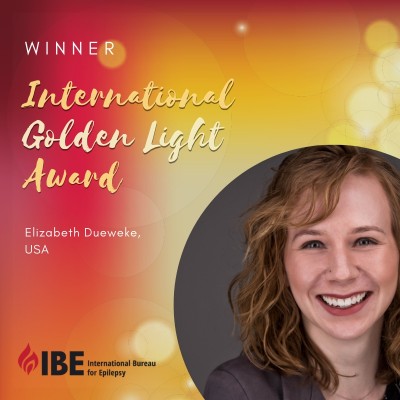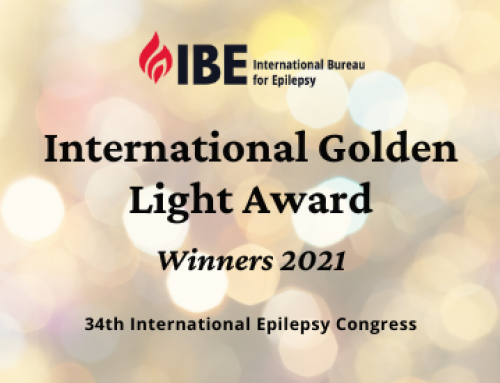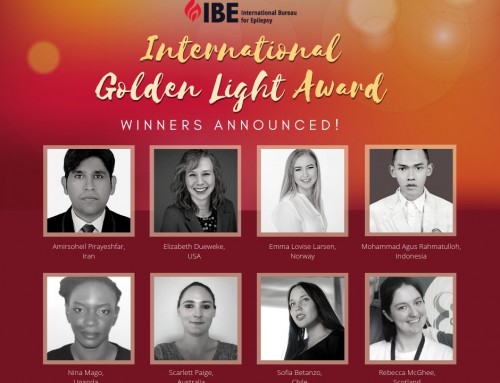
Searching for the Right Story
By Elizabeth B. Dueweke
At 18, my future felt certain. I was going to study at Smith College and become a journalist. I loved to meet people and tell their stories. I knew it wouldn’t be easy, but I was ready to take on my dreams.
My plans for my future changed a few months before graduation when I had my first seizure in the school computer lab. I stood up, looked around, and crashed to the ground. Dozens of students saw me carted out of the high school on a stretcher, their faces pressed to the classroom windows.
The scene repeated itself months later. I nursed a tongue cut by clenched teeth along with my damaged ego. My doctor couldn’t give me any answers. There was no guarantee the seizures would stop.
I felt incredibly lonely. My doctor said “epilepsy” and my family didn’t talk about it. I didn’t think there was an entire community of people like me.
The prejudice I experienced didn’t help. I was turned away from the emergency room, dismissed as needing therapy. The uncomfortable stares, and my new doctor’s fruitless tests because he didn’t believe my diagnosis, wore me down.
I found some seizure control by reducing my stress levels and getting more sleep. As I made these changes, I grew scared to take on new challenges. I turned away from the career I thought I could have, frightened I couldn’t handle it anymore. What if I seized in an interview? How could I work on stories if I needed 8 hours of sleep?
Another blow came my junior year when my study abroad program in Jordan rescinded my acceptance after I revealed my diagnosis. I studied Arabic in college and considered it my new career path. A representative of the program insisted that I would not be accepted in Jordanian culture.
After telling my mom I was rejected because of my epilepsy, she asked why I told them the truth. I started to feel like I would have to lie about who I was my entire life. The program did readmit me, but the initial rejection of an entire country still stung.
My breaking point came the fall after I returned from Jordan. I had my first public seizure since high school. The wide, open eyes of the people staring at me as I lay on the floor followed me everywhere. I felt more alone than ever before and knew something had to change. I started seeing a counselor so every part of my brain—the emotional and neurological—could better cope with epilepsy. It wasn’t easy, and while I was on the road to feeling better, I still felt afraid and uncertain.
A few months after graduation, I moved to Washington, D.C., where I learned about the National Walk for Epilepsy for the very first time.
When I saw the ad for the walk, I couldn’t believe that people like me would gather in the open to celebrate themselves. Even bigger than that, an entire organization called the Epilepsy Foundation existed. After pouring over their website, I knew I had to dedicate my life supporting them.
My passion for fundraising for the Epilepsy Foundation was noticed by my hometown newspaper, and I shared my story and talked about their important mission. The article was noticed by the President of Smith College who sent me a letter that said, “Drawing from your experience and willingness to share your personal journey, you help others learn how to deal with the challenges and prejudices surrounding epilepsy.”
The letter helped me realize I could reach others at a much larger level. I decided to pursue a graduate degree in public health and communications to combine my passion for telling stories with improving health for people with epilepsy. This concluded in a final project where I conducted research on the perceptions of D.C. employers on employing people with epilepsy. Months after graduation, I presented this research at the American Epilepsy Society annual conference. To be a person with epilepsy in such a distinguished forum, noticed for my research, made me feel like I finally found where I belonged all these years.
While finishing my studies, I was hired by the Epilepsy Foundation as the manager of communications. Every day, I work to bring epilepsy further out of the shadows.
I still tell stories every single day with my incredible team. I highlight the amazing work of our local network. I celebrate the accomplishments of people with epilepsy and their families. I bring their stories out of the darkness and into the daylight. From seizure-free milestones and breakthrough seizures to heartrending tragedies, I help tell them all. I never lost the dream or career I thought I could have. I just found the stories I needed to tell.




